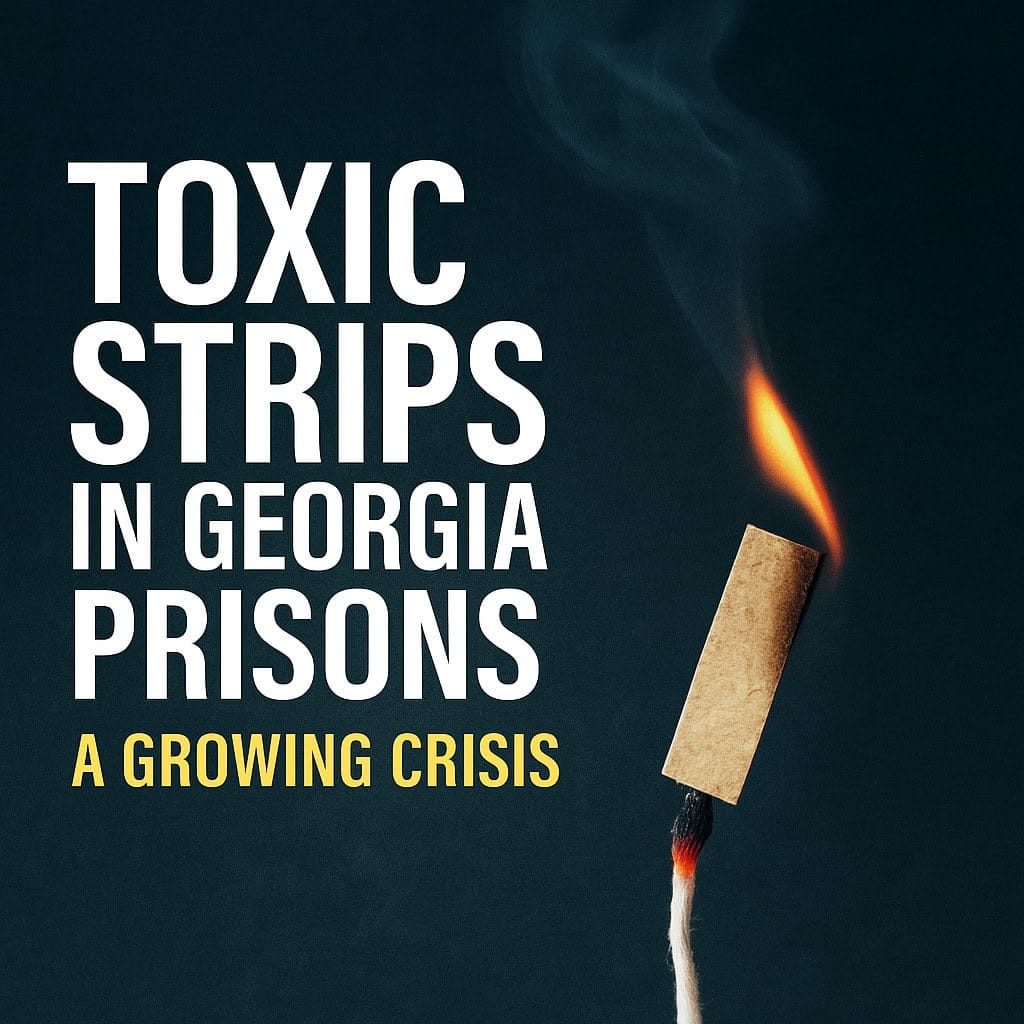Inside Georgia’s overcrowded and understaffed prisons, a silent epidemic is spreading—one that doesn’t make the headlines but leaves bodies on the floor and clouds of acrid smoke hanging in the air. Known on the inside simply as “strips,” this cheap and deadly drug has become the new high of choice for inmates desperate to escape the chaos around them. But what’s really happening is far more sinister: a chemical crisis being facilitated through the Georgia Department of Corrections’ own mail system.
What Are “Strips”?
Strips are tiny pieces of ordinary paper—typically 2 to 3 millimeters wide and 10 millimeters long—cut from legal mail or other documents soaked in liquid synthetic drugs, most commonly K2 or other synthetic cannabinoids. These drugs are often dissolved in acetone or alcohol, then sprayed or soaked into sheets of copy paper before being mailed into prisons disguised as legitimate correspondence.
Once inside, inmates cut the drug-laced paper into strips and sell each one for the price of a soup ($0.79). The strips are smoked by lighting the end of a tightly rolled toilet paper wick and inhaling the burning chemical through the hollow tube of an ink pen. The smell is acrid and metallic, coating the dorms in a haze of toxicity.
“I’m in a dorm of mostly strip-junkies,” one inmate told GPS. “In this 80-man open dorm, at least 25 get high on strips multiple times a day. We might have a dozen of these guys just passed out laying on the floor at any given time. There is very little ventilation, so the rest of us are exposed to the smoke as well. What could this second-hand smoke be doing to the rest of us?”
A Dorm Full of Zombies
The physical and psychological effects of these strips vary wildly by batch, but all are terrifying:
- Some inmates collapse and vomit uncontrollably.
- Others enter a zombie-like state—unconscious while standing, or slumped over for 15 to 30 minutes.
- The most disturbing episodes involve inmates “wigging out,” screaming or violently convulsing.
One prisoner described it as “watching someone being unplugged from reality.”
This isn’t rare or isolated. In many Georgia dorms, at any given time, you can see bodies lying on the floor, passed out from the latest hit. Officers often step over them, ignoring the danger, because responding would mean acknowledging the scope of the problem.
Secondhand Smoke and Shared Consequences
The synthetic chemicals in these strips don’t just affect the users. In poorly ventilated open dorms, secondhand smoke exposure is a real concern. The health effects of burning synthetic cannabinoids are poorly understood, but they’ve been linked to:
- Respiratory distress
- Heart problems
- Seizures
- Psychotic episodes
There are no protective measures in place for non-using inmates who are forced to inhale these toxic fumes multiple times a day.
How It’s Getting In
This crisis is not being caused by contraband cell phones or physical drops—it’s being mailed in.
The primary vector of this drug is the U.S. Postal Service and GDC’s own mail screening process, which continues to allow soaked paper through. While the GDC publicly blames cell phones and outside influences, the real trafficking is happening through legal and regular mail—a method that the agency has failed to shut down, despite knowing exactly how it works.
GDC’s Inaction Is Complicity
If the Georgia Department of Corrections wanted to stop this epidemic, they could:
- Require chemical screening of mail using ion scanners or swab-based tests (like other states do).
- Move to scanned digital mail systems where inmates receive photocopies rather than originals.
- Train staff to identify soaked paper and track usage patterns.
- Launch educational and recovery programs for addiction treatment inside prisons.
Instead, the GDC has done virtually nothing—allowing the strips to flow in, be sold openly, and poison entire dormitories.
A Crisis Hidden in Plain Sight
What’s happening now is slow-motion mass poisoning. With a quarter or more of the population in some dorms using strips daily, the entire environment becomes toxic. This isn’t just about drugs. It’s about GDC’s refusal to act, to acknowledge, or to care.
“They say it’s about security, but they really don’t want to stop it,” one inmate explained. “They want us numb, they want us fighting each other, not organizing. The strips keep us quiet and sick—and that’s exactly how they want us.”
What Needs to Happen
Georgia’s prison drug epidemic is being fueled by synthetic-laced paper coming through GDC’s own mail system. It’s time to:
- Ban direct paper mail and switch to scanned, photocopied correspondence.
- Introduce mandatory chemical testing for all incoming mail.
- Treat strip addiction as a medical issue, not a disciplinary one.
- Improve air quality standards and install basic ventilation in dorms.
- Hold GDC leadership accountable for knowingly allowing a chemical crisis to unfold.
The Bottom Line
The GDC is enabling a drug crisis that leaves inmates unconscious, sick, and addicted—then does nothing to help them recover. Strips are cheap, deadly, and flooding every facility. Until the state takes real action, prisoners and staff alike will continue to suffer the consequences.
This is not just a drug problem. It’s a systems failure. It’s a health crisis. And it’s a scandal that can no longer be ignored.
How You Can Help
This crisis won’t end unless people on the outside speak up. The Georgia Department of Corrections isn’t going to fix this on its own—and lawmakers won’t act unless we force them to.
You can help by taking just a few minutes to raise your voice:
- Use ImpactJustice.AI to generate and send powerful, personalized messages to Georgia lawmakers, the media, and oversight agencies. It’s fast, free, and built for this moment.
- Call or write your state legislators and demand that they investigate the GDC’s mail practices, improve addiction treatment options, and install proper ventilation in prisons.
- Share this article on social media and in community groups to expose what’s happening and build public pressure.
Don’t stay silent. Every message, every call, every share counts. This is about saving lives. Be part of the movement to demand transparency, safety, and accountability in Georgia’s prisons—starting now.



The guards are bringing it in everybody knows that
I’d really like to know if it is addicting like if they don’t have it do they go through withdrawal like you